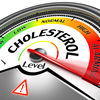When Are Palpitations Serious?
Palpitations can be very frightening. But most palpitations do not indicate underlying heart disease. If you are having palpitations, there is a good chance that nothing is seriously wrong. See What are palpitations. So when are palpitations serious? Palpitations could be a reason for concern if they are caused by an underlying heart disorder (such as heart valve […]
When Are Palpitations Serious? Read More »

